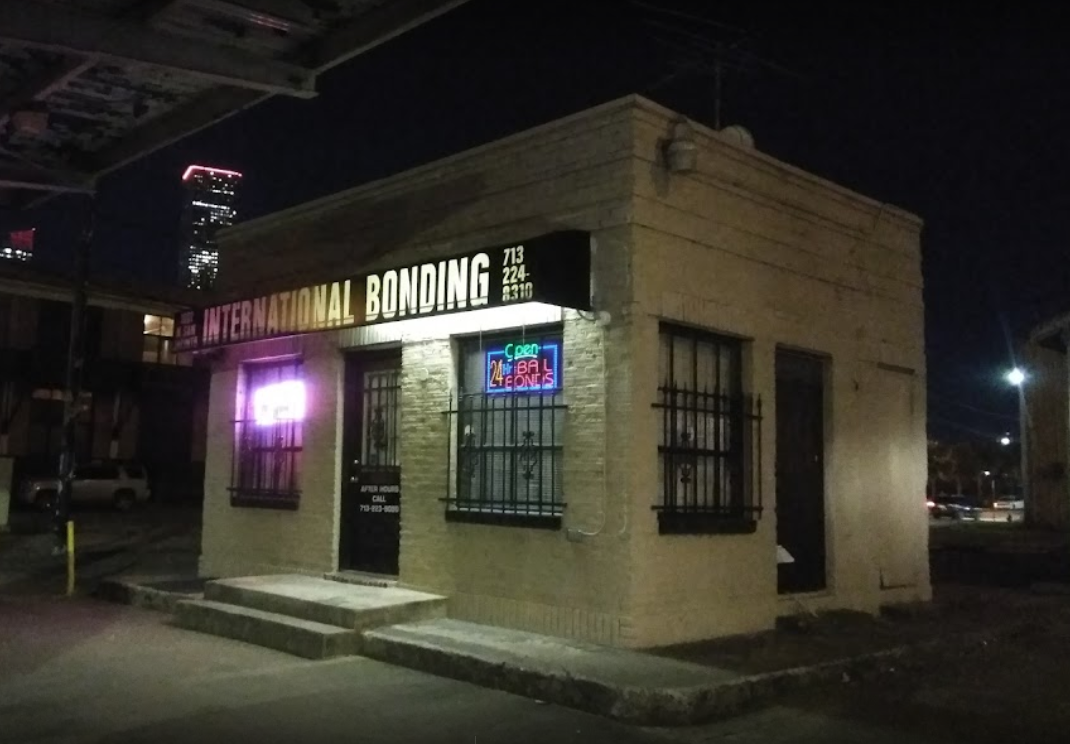Harris County’s Cash Bail Struggles: The Profitable Market of the Criminal Justice System
Rohit Shajan, Harris Fellow, Office of Harris County Treasurer Dylan Osborne
July 25, 2022
An arrestee in Harris County, or any other county jurisdiction, expects to interact with two institutions of justice: the police and the judiciary. Beyond these public institutions, most arrestees rely on a commercial entity: the bail bond industry.
Cash Bail
If arrested in Harris County for violent crimes, you will most definitely dial one of the seventy-six bail bond agencies licensed by the county’s bail bond board. Cash bail enables defendants to avoid confinement for months while awaiting trial. According to the Bureau of Justice Statistics, approximately 65% of jail inmates await “court action on a current charge.”[1] Bail bonds should be a tool of fairness in a system where all defendants are innocent until proven guilty. However, the cash bail system can be as lucrative as the tacky names and downscale structures of bail bond companies in Houston.
 (International Bonding Co. Houston, TX)
(International Bonding Co. Houston, TX)
Bail bond companies profit through cash bail, which includes surety bonds. Regardless of the bail amount, bondsmen collect a 10% premium. At a standard 10% rate, bondsmen charge $100,000 as a nonrefundable premium for a million-dollar bond. Additionally, a handful of national corporations insure bondsmen, which abolishes any financial risk. However, the average low-income defendant is responsible for fees and installments to pay off the premium. Assets, including houses, sometimes may be offered as collateral in bond agreements. In Maryland, bail bond companies collected $75 million in nonrefundable payments from innocent defendants over five years.[2] Bail bondsmen reap the profits while low-income and minority defendants assume lifetime debt.
Harris County’s Bail Bond Struggles
Harris County’s bail bond system has stumbled. Public officials criticized bail bond companies for collecting 2% or 3% surety bond premiums for some violent offenses, a possible explanation for a surge in violent crime in the county. Of the 407 individuals arrested for capital murder charges in the past five years in Harris County, 113, or 28%, of arrestees were out of jail on bail. Of the 113, 30, or 27%, were arrested for another crime.[3] Backlog of trials means violent perpetrators can avoid jail for months.
 (Harris County Bail Bond Board Meeting: April 13, 2022)
(Harris County Bail Bond Board Meeting: April 13, 2022)
Inspired by desperate pleas from victims and their loved ones, the Harris County Bail Bond Board, the principal local bail bond regulatory authority, mandated a 10% premium for certain violent crimes.[4] But there is no guarantee it will stabilize violent crime rates. Although it prevents defendants from exiting jail for lower premiums, it inflates the price of freedom for low-income and under-resourced minorities, who are yet to be proven guilty. The current situation begs for a more comprehensive solution.
 Figure 1
Figure 1
Source: Prison Policy Initiative. Mass Incarceration: The Whole Pie 2016. March 14, 2016
https://www.prisonpolicy.org/reports/pie2016.html
A Monumental Reform
Instead of commercializing the bail system, Texas should venture away from cash bails. Texas should draw inspiration from Illinois and California. Illinois’s Pre-Trial Fairness Act (HB 2653) eliminated cash bail in the state. The legislation supplies judges with risk assessment tools when considering bail. Legislation also mandates bail training for magistrates. Magistrates and judges are required to evaluate “a real risk of a present threat or willful flight.”[5] The nature of the offense and the defendant’s criminal history weigh heavily in the process. Hence, repeat offenders are less likely to be out on bail. Prosecutors can make recommendations regarding bail, and defense attorneys can present mitigating factors.Harris County enacted similar monumental reform when it ended cash bail for defendants charged with minor offenses. Research shows that the number of misdemeanor cases in the county has declined, and recidivism rates have stabilized.[6] Hence, ensuring public safety and restoring fairness. Similar results are possibly attainable with the elimination of the cash bail system.
 (Texas State Capitol)
(Texas State Capitol)
The Texas Legislature is the only government body capable of reforming the bail bond system in Harris County and the state of Texas. The cash bail system in Texas is broken, and residents should elect state senators and representatives willing to enact monumental bail reform through legislation. The commercialization of bail should cease. Freedom should not discriminate between rich and poor, majority and minority, and privileged and disadvantaged.
The content and opinions expressed on this webpage are solely the writer’s own and do not reflect the views of nor are they endorsed by the University of Houston or the Hobby School of Public Affairs.
Sources:
[1] https://bjs.ojp.gov/content/pub/pdf/ji19.pdf
[2] https://www.theatlantic.com/business/archive/2017/05/bail-bonds/526542/
[3] https://www.khou.com/article/news/investigations/capital-murder-suspects-bonding-out-of-jail/285-828fb5f0-dede-4a7e-97f7-df30bf2207f9
[4] https://www.houstonpublicmedia.org/articles/news/criminal-justice/2022/04/14/423234/harris-county-officials-set-10-bail-bond-minimum-to-limit-people-released-from-custody/
[5] https://news.medill.northwestern.edu/chicago/illinois-criminal-justice-reform-law-eliminates-bail-but-doesnt-erase-bias-in-risk-assessment-for-pretrial-imprisonment/
[6] https://www.houstonpublicmedia.org/articles/news/criminal-justice/2022/03/03/420398/two-years-on-harris-countys-misdemeanor-bail-reforms-appear-to-be-working-as-intended/